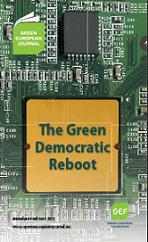Alvarez, F., Le Bihan, H. & Lippi, F. (2014) “Modelling sticky prices and the effect of monetary shocks“, VoxEU Organisation, 30 September. The assumption of sticky prices is central in understanding the effect of monetary policies on the economy. Yet, how to best model price stickiness is an unresolved issue. This column assesses a selection of models that are able to reproduce cross-sectional heterogeneity in the setting of prices. …Read More
Value of health – too often ignored and forgotten by EU policy-makers?
Hedberg, A. (2014) “Value of health – too often ignored and forgotten by EU policy-makers?“, European Policy Centre (EPC) Publications, Commentary, 29 September. Whether on national or European level, policy-makers tend to under-value health, healthy society, and healthy citizens in policy-making. As the European Commission continue to ponder how questions related to health should be reflected in EU policy-making and what role it should take, there are three issues …Read More
The Eurozone’s Unresolved Situation – Can market forces prevail in the Eurozone?
Tavares, E. (2014) “The Eurozone’s Unresolved Situation – Can market forces prevail in the Eurozone?“, ΘZeroHedge, 28 September. With another round of central bank intervention coming four plus years after the start of the Eurozone debt crisis, this is a question worth considering, at a time when the Southern Eurozone members – Italy, Spain, Greece and Portugal, which collectively account for over 30% of the GDP of the early …Read More
Cross-country differences in perceptions of inequality
Niehues, J. (2014) “Cross-country differences in perceptions of inequality“, VoxEU Organisation, 28 September. Income inequality is high in the US, but the support of social welfare programmes is low. In Europe, income inequality is low and the welfare states are generous. This column argues that this paradox is largely due to perceived inequality. Many Europeans believe that there is high inequality in their countries, justifying the need for redistributive …Read More
The Green Democratic Reboot
Green European Journal (2014) The Green Democratic Reboot, Green European Foundation, Annual Print Edition 2014, September. In recent years, the volume of articles and books dedicated to the democratic crisis has been constantly expanding. The same is true of the literature addressing the ecological crisis. Yet a simultaneous reflection both on the ecological and on the democratic crisis has not accompanied this proliferation. This is the intention of this …Read More
Europe’s Austerity Disaster
Stiglitz, J. (2014) “Europe’s Austerity Disaster“, Social Europe Journal, 29 September. “If the facts don’t fit the theory, change the theory,” goes the old adage. But too often it is easier to keep the theory and change the facts – or so German Chancellor Angela Merkel and other pro-austerity European leaders appear to believe. Though facts keep staring them in the face, they continue to deny reality. Austerity has …Read More
Deleveraging, What Deleveraging? The 16th Geneva Report on the World Economy
Buttiglione, L., Lane, P., Reichlin, L. & Reinhart, V. (2014) “Deleveraging, What Deleveraging? The 16th Geneva Report on the World Economy“, VoxEU Organisation, 29 September. The world has not yet begun to deleverage its crisis-linked borrowing. Global debt-to-GDP is breaking new highs in ways that hinder recovery in mature economies and threaten new crisis in emerging nations – especially China. This column introduces the latest Geneva Report on the …Read More
Small business productivity and access to financing
Krishnan, K., Nandy, D. & Puri, M. (2014) “Small business productivity and access to financing“, VoxEU Organisation, 26 September. The greater access to capital could increase small firms’ investment efficiency. Others argue that it may result in wasteful expenditures. This column discusses how small firms were affected by the Interstate Banking and Branching Efficiency Act of 1994, which allowed interstate banking. The authors find an increase in the productivity …Read More
The relationship between national parliaments and the European Parliament remains contested in the area of economic governance
Kreilinger, V. (2014) “The relationship between national parliaments and the European Parliament remains contested in the area of economic governance“, LSE EUROPP, 26 September. The Fiscal Compact, which was signed by 25 of the EU’s member states in 2012, created an inter-parliamentary conference to enable national parliaments to discuss major issues of economic and financial governance. The third meeting of this ‘Inter-parliamentary Conference for Economic and Financial Governance’ will …Read More
The European Investment Bank should invest more, not less – EIB played some counter-cyclical role during the crisis, but now plans to reduce investments
Darvas, Z. (2014) “The European Investment Bank should invest more, not less – EIB played some counter-cyclical role during the crisis, but now plans to reduce investments“, Bruegel Think Tank, 24 September. There is a growing recognition among policymakers, not least thanks to the Jackson Hole speech of ECB President Mario Draghi, that Europe faces the problem of demand shortage, in addition to various structural problems which can be …Read More






